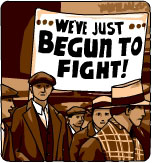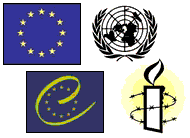Equal Rights: Answers
Created | Updated Jan 13, 2013
All people are created equal, right? Some have been more equal than others.
Equal Rights: Answers

True or false?
- The Talmud specifically states that a husband can divorce his wife if she spoils the dinner. True. However, this was not encouraged.
- In Romania, Roma people are considered slaves of the local landowners. False. The Roma were emancipated in Romania in 1851.
- The Middle Passage was a particularly desirable form of Atlantic cruise. False. The Middle Passage is the term used to refer to the transportation of kidnapped people from Africa to the New World aboard slave ships.
- Robert Louis Stevenson's novel Kidnapped was 'ripped from the headlines'. True. The kidnapping of David Balfour, with the intention of selling him as indentured servant, mirrored the case of James Annesley, who spent twelve years as an indentured servant before escaping and obtaining justice.
- Women in ancient Egypt could not own property. False. Unlike women in ancient Greece, Egyptian women could own property and had equal status before the law.
- The term 'Catholic Emancipation' refers to getting out of parochial school at 18. False. 'Catholic Emancipation' was the process of granting Catholics in the UK the right to own property, join the army, and inherit land.
- In 1872, a woman was arrested for voting in the US. True. Susan B Anthony was trying to make a point, but she was also breaking the law by voting in a presidential election. Her image later ended up on a dollar coin, so somebody learned something.
- An 1876 San Francisco law mandating haircuts was designed to keep people out of jail. True. The so-called 'Pigtail Ordinance' discriminated against Chinese immigrants, because it said that if you went to jail, you had to have your hair cut short – which inflicted cultural damage on men whose queues were a sign of social belonging. Apparently, very poor people were breaking the sanitary laws in overcrowded tenements, just to get a warm bed and a few square meals.
- In 1920, British police volunteered to help Indians make salt. False. British authorities were opposed to Indian salt-making. Mahatma Gandhi organised the salt-making as a non-violent form of protest against unfair taxes.
- Children's rights were recognised by Magna Carta. False. The idea of children's rights is relatively recent. See the 1924 Geneva Declaration on the Rights of the Child. But it's a good idea, don't you think?
Were you surprised at some of the answers? Maybe you'll want to find out more about the history of human rights.

